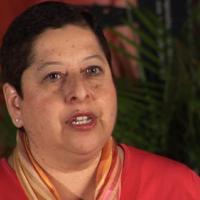Class: [singing] Buenas noches, buenas noches. Como estais? Como estais?
Reba: One thing that parents can appreciate is a good preschool program. In many communities they can be hard to find…
Dr. Rebecca Palacios: Muy Bien! Gracias.
Palacios: A lot of people don’t embrace it because they think oh, well, you’re just going to go and you’re going to sleep and they’re going to play and nothing’s going to happen and I think what people don’t understand is how much work goes into a quality preschool program
Reba: One ingredient is a well-qualified, well-trained teacher — and they are in short supply. Only half of preschool teachers have a four-year degree — and often that degree has little to do with early childhood.
Reba: So while they probably don’t know it, this class of four-year-olds has lucked out with Dr. Becky Palacios. She teaches the Spanish half of a dual language program in Corpus Christi, Texas.
Reba: With a PhD in Education and more than 30 years in the classroom she knows how to create a literacy rich preschool environment.
Reba: Her cardinal rule — keep your expectations high.
Palacios: I think that the curriculum that we’ve developed is pretty demanding. If we’re going to talk about bears we’re going to talk about the natural habitat, where they live, where they are in this world, why the geography’s important. I think it’s demanding only what’s best for students. When we ask students to rise up to the higher standards or higher expectations, they don’t let us down.
Reba: A curriculum like this allows children to build their vocabulary and to develop their background knowledge. If you know a lot about bears already, it’s a lot easier to read and understand a story about bears when you get to first grade.
Reba: And of course, in preschool, it’s very important to have fun.
[kids yelling]
Reba: When children are actively engaged — collecting leaves or playing with a purpose — they develop the social and early literacy skills which will help them succeed in school.
Reba: Dr. Robert Pianta has been studying preschoolers for more than 25 years.
Dr. Robert Pianta: We know they learn how to get along with other kids, they learn how to line up and be able to find the bathroom in a school and we know that they learn things about the world, about math and shapes and letters and numbers, all of which roll into the skills that… make a big difference when…they walk in on that first day of kindergarten.
Reba: Keeping all these four-year-olds on track is no easy job.
Palacios: When you enter a classroom, especially in a preschool program you have to be high energy, high patience with the students and be well prepared.
Reba: Dr. Palacios has 23 students in her class — 22 four-year-olds and one 30-year-old — Denise Caldera.
Denise Caldera: When I started my lesson, I said, “Ok, everybody sit down quietly and cross your legs and put your hands on your lap…”
Reba: Denise attends Texas A&M University, and she’s studying to become a teacher.
Reba: She spends part of every day observing and working with Dr. Palacios. Denise has seen already how much this can help.
Denise: Muy bien.
Denise: We’re gonna be there every day all day. It’s basically we’re going to be in charge of the classroom. We’re going to have to implement lessons. We’re going to have to grade. We’re going to have to have parent conferences. And if we have no exposure in the classroom and we don’t know what it’s like to be in the classroom, then we’re going to be completely lost.
Reba: The combination of college coursework and a mentor like Dr. Palacios is giving Denise the tools she’ll need to manage a classroom by herself.
Pianta: In the training of early childhood educators, it’s critical that the training programs offer them opportunities to go in there and practice executing their knowledge of child development with children, get support about that and feedback about that from somebody who’s experienced and knowledgeable in those kinds of experiences have been shown in a lot of research about the training of teachers to be probably one of the most critical features in predicting those teachers’ skills when they have a classroom of their own.
Denise: Before I started working with Dr. Palacios I thought preschool was about babysitting, and naps and playing but after watching her — I mean, these kids go through strict curriculum by no means is it naptime and daycare.
Palacios: What have you experienced? What do you see in classroom management?
Denise: Well, you saw my second lesson. Out of seven kids four were crying. (laughter) Almost myself included, I was so close to crying. I was trying everything with them and it seemed like nothing was working.
Palacios: So why didn’t I bail you out?
Denise: Because in my classroom there will be nobody to bail me out. I will be on my own and I’ll have to handle it.
Palacios: And I wanted you to realize that you have to learn what doesn’t work so you can learn what will work.
Palacios: I think being a clinical teacher to pre-service teachers is really important. We need to make sure that we leave a legacy for the teachers that are going to follow us. We’re seeing a huge shortage because a lot of these young teachers or new teachers leave within the first 3-to-5 years of their teaching experience. They cite that one of the things is lack of mentoring. They are not helped when they come into the classroom:
Denise: Si encontraron? Si.
Reba: As a mentor, few can match Dr. Palacios, with her knowledge of the field, her long experience, and her sheer love of teaching.
Palacios: I always wanted to be a teacher because I felt that this is where I belonged; I had this calling to work with children. And as far as I can remember through my school career I saved strategies, I saved songs I learned in Elementary — art projects, things that were focused on exploration, things that we learn by doing.
Reba: With a wait list over fifty and parents lining up around the corner to get their kids in the program, Dr. Palacios is obviously doing something right.
Class: (laughing)
Jennifer Gonzalez: [Justin] comes home really excited and he can’t wait to tell me everything that he’s done. He wants to get everything out so fast that he actually started stuttering…’cause he had so much to say. [laughter]
Palacios: I’ve had a lot of opportunities to leave the classroom. People always asked me, “you have a doctorate, why do you stay in a preschool classroom? Why are you there?” And I tell them it’s not about who I am — it’s who the children are. And I’m going to get a little emotional here, but I think it’s about the kids and not about me.
Reba: When I was little, two of my heroes were John Wayne and Joe Namath. As I grew older, though, I realized the some heroes weren’t always in the spotlight. They were people like my own mother — parents and teachers who are doing the hard work of raising our kids.
Reba: With their help, we can send more of our children on to school — and out into the world — ready to find success.
Reba: To learn more about preschool and early literacy, please visit us online at pbs [dot] org.


